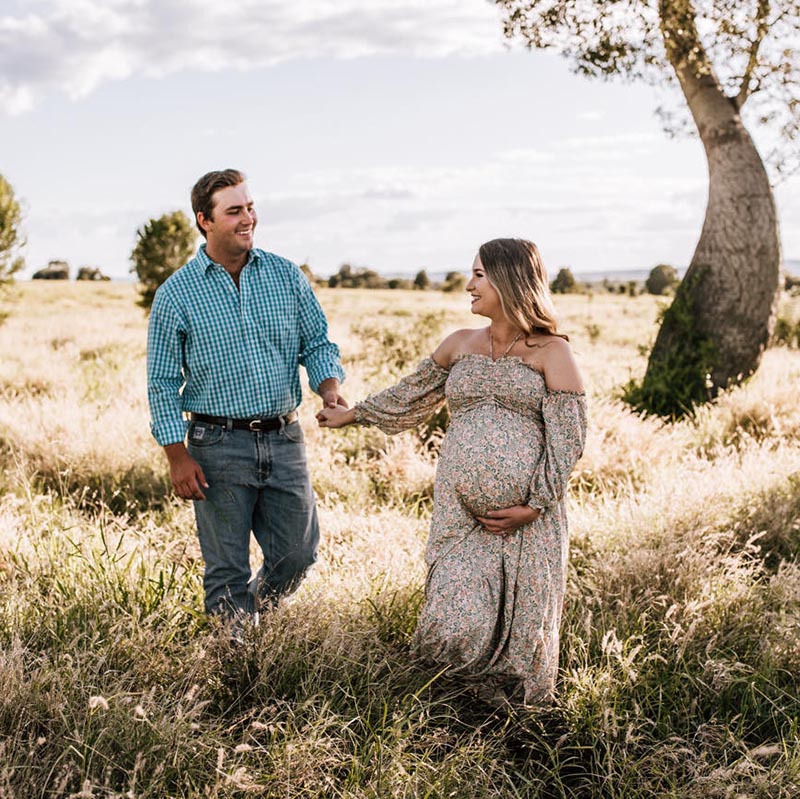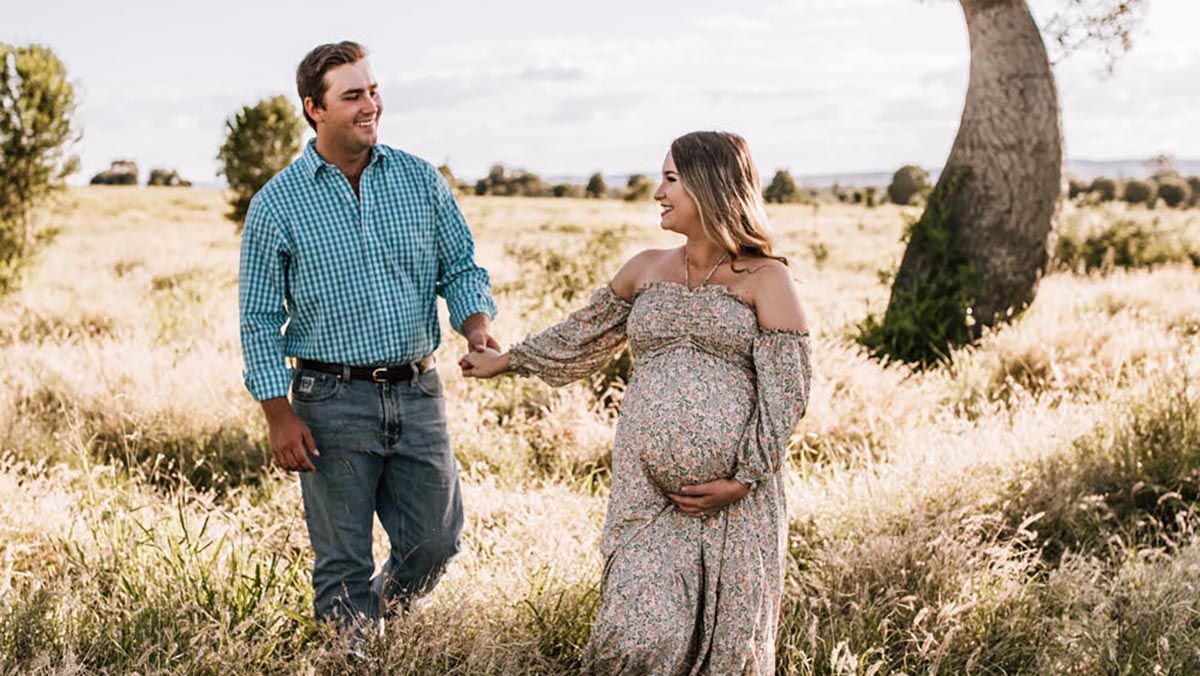It can be tricky when everything you eat and drink during pregnancy is measured and controlled to prevent harm to your unborn baby. That’s been life for me as an expecting mum over the past nine months.
I have phenylketonuria (PKU), one of the rare genetic conditions for which newborn babies in Australia are screened. If PKU is left untreated, phenylalanine builds up and can cause damage to the brain.
For my whole life, I’ve been on a low-protein diet because my liver can’t break down phenylalanine, one of the amino acids found in the protein in food.
My food intake has been tracked since I was a baby

My phenylalanine levels are also checked via regular blood tests. After 28 years of living with PKU, I’m used to being a vegetarian who drinks an interesting tasting formula to get the proteins and nutrients I miss out on due to my metabolic condition.
PKU was sitting in the background of my life until last year, when I was ready to become a mum myself. While the strict PKU diet was vital when I was a kid and my brain was developing, it became an even more important consideration leading up to and during pregnancy.
During adolescence and adulthood, my doctors had always warned me about what could happen if I fell pregnant unexpectedly and didn’t have proper management of my diet. Because phenylalanine could cross the placenta and harm the baby’s brain, my food intake became the centre of my world.
The Queensland Lifespan Metabolic Medicine Service was my lifeline before and during pregnancy. Even though I was living in a small town two hours inland from Rockhampton, the specialist medical care for me as a PKU mum was only a phone call, email or telehealth appointment away.
The Lifespan metabolic dietitians worked out a pre-conception diet, which I followed for months before trying to fall pregnant.
I wasn’t one of those lucky enough
I opted first to trial a drug which had the potential to increase my body’s tolerance for protein. It was exciting as it was the first alternative treatment I’d ever been offered. Most importantly, it could mean less risk in pregnancy because it would be easier to maintain low levels.
But after months of trying to get my levels to the right point to test the drug for a week, it became clear I wasn’t one of those lucky enough to respond to it. So, we started over again with the tiniest protein intake. Even most fruit and vegetables have significant amounts of protein for a PKU person. Bread, pasta, rice and dairy are much higher in protein, so it’s not easy to for me to get in the calories I need to maintain low phenylalanine levels.
My protein intake was initially halved, and then it was halved again until my phenylalanine levels were low enough for the go-ahead to try to conceive. Each week, I would do a finger prick test with a lancet, fill a circle with blood on those same little cards they use for the newborn heel prick, and drop it to my local hospital to be sent off to the pathology lab in Brisbane for processing.
When the faint line appeared on the pregnancy test, my husband Ashley and I were over the moon. Still on a high, my first phone call was with my Lifespan nurse practitioner consultant, Anita, who has known me since yearly clinics in Townsville, where I grew up. She rang straight away in response to my email with the big news. It felt so far-fetched to think that it was finally happening, that we were having a baby.
It was all go

My team rushed me to Brisbane pretty quickly once we knew I was pregnant. It was all go. It was stressful for me because I wanted to do everything I could to make sure my baby was healthy. In the hospital, they monitored me and took regular bloods to establish a baseline of where my protein intake was and to develop a plan going forward.
A few weeks later, morning sickness threw everything back into chaos. For the first trimester, it was a struggle to keep down both food and my formula. Not getting the right nutrition and calories meant my levels were spiking. Missing meals or switching just to dry crackers wasn’t an option in the delicate balancing act of PKU pregnancy. So, it was back to hospital in Brisbane for a week so they could get fluids into me, get me on the prescribed diet, take daily bloods and ensure I was once again tolerating food.
After that tricky first trimester, the morning sickness thankfully passed and it was just down to the much simpler task of juggling my food intake, frequent blood testing and the extra scan appointments to check the baby’s growth and development.
As my baby grew bigger, they could begin to metabolise some of the protein I was eating, so the protein allowance of 40g a day in the third trimester was a breeze compared to the 4g I was on in the early stages of my pregnancy journey. We know our baby won’t have PKU but will be a carrier of the gene that causes PKU, just as both my parents are.
I’ve had more than 50 blood tests during my pregnancy—a combination of bloodspots and venepuncture. I’ve come a long way from when I was a toddler and my parents and I used to call a blood test “a brave”, a term they used to talk me into one at home or the hospital. Everything I ate was weighed and written down in a little diary, and it would be a worry when I became unwell because a fever can cause phenylalanine levels to increase.
Coming full circle
While living in northern, central, and now southwestern Queensland, I’ve had the very best medical support throughout my life. The Lifespan team has been invaluable in providing me with gold star care, working with the local hospital so I could get my blood test cards to Brisbane quicker. It feels like things have come full circle and can be quite surreal that some of the Lifespan practitioners who I am in contact with regularly have seen me since I was a baby.
When I was young, I got to meet other kids with PKU through the Metabolic Dietary Disorders Association (MDDA), which would organise a social gathering around the annual clinic. Seeing other PKU kids who are healthy and thriving is probably the biggest reassurance for new parents of PKU babies.
If affected, I would highly recommend connecting with the MDDA as they can put you in touch with other PKU families in your area. Because PKU affects only 1 in 10,000 to 15,000 babies born in Australia, there aren’t that many of us around, so it’s good to share experiences with each other.
Dinners out always involve me researching menus ahead of time
I’ve never tried meat, which always surprises people. Each outing involves me having to explain why I’ve ordered chips and salad and not a nice juicy steak! Funnily enough, I am married to a stock agent who grew up around cattle and now sells them.
PKU has never stopped me from achieving what I wanted in life, from my studies to career. I count myself lucky to have a condition that is treated so effectively by something as simple as a diet. I’ve maintained healthy levels throughout childhood and into adulthood, largely thanks to my parents.
I’m so grateful to the dieticians, doctors, nurses and those in the pathology lab who have helped me through this super high-maintenance pregnancy. They say it takes a village to raise a child, and in my case that’s even before the baby is born.
How helpful was this article?
Click on a star to rate it!
5 / 5. 1
Be the first to rate this post!
Casey Steel
Related posts
Subscribe
Receive personalised articles from experts and wellness inspiration weekly!


